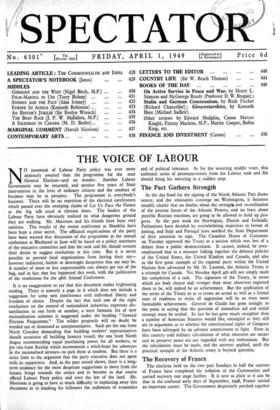The Pact Gathers Strength
As the day fixed for the signing of the North Atlantic Pact draws nearer, and the emissaries converge on Washington, it becomes steadily clearer that no doubts about the strength and co-ordination of the present forces of the Atlantic Powers, and no fears about possible Russian reactions, are going to be allowed to hold up pro- gress. In the past week the Norwegian, Danish and Icelandic Parliaments have decided by overwhelming majorities in favour of joining, and Italy and Portugal have notified the State Department of their intention to sign. The Canadian House of Commons on Tuesday approved the Treaty at a session which was less of a debate than a public demonstration. It cannot, indeed, be over- emphasised that as a measure linking together the defence policies of the United States, the United Kindom and Canada, and also as the first great example of the regional pacts within the United Nations first advocated by Mr. St. Laurent, the Atlantic Treaty is a triumph for Canada. Yet Monday April 4th will not simply mark the completion of a task. The signature of the Treaty, in terms which are both clearer and stronger than most observers expected them to be, will indeed be an achievement. But the application of the terms of the Treaty so as to create an actual as well as a formal state of readiness to resist all aggression will be an even more formidable achievement. General de Gaulle has gone straight to the point in saying that the question of immediate aid and initial strategy must be settled. In fact he has gone much straighter than a number of American Senators would like, entangled as they still are in arguments as to whether the constitutional rights of Congress have been infringed by an advance commitment to fight. Even in this country cold military calculations of what measures are neces- sary to preserve peace are not regarded with any enthusiasm. But the calculations must be made, and the answers applied, until the practical strength of the Atlantic treaty is beyond question.






































